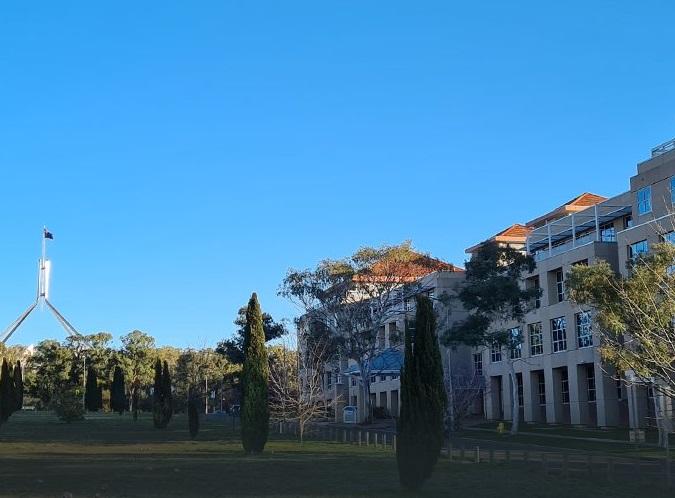
Australia, through its diverse communities, expansive geography and entrepreneurial spirit, maintains deep, yet often not well understood, regional connections beyond its borders.
If we are to build on these connections, then Australia’s Department of Foreign Affairs and Trade officers working on Pacific issues need to get out of Canberra.
This may seem nonsensical. Of course, DFAT is out of Canberra! Not only does it have domestic offices in each state and territory capital, DFAT has locations all over the world, representing Australia from 120 diplomatic posts across the globe.
What’s needed is DFAT, specifically, its Office of the Pacific, in northern Australia.
It sounds silly at first—why would we focus our international diplomatic efforts in our own country? But the answer is quite simple. Australia’s northern regions are the doorway to the Indo-Pacific. Profoundly deep ties across history, migration, trade, language and culture already exist between northern Australia and our closest Pacific neighbours. Flying ministers from their offices in big cities in the south of Australia directly to the capital cities of Pacific island states misses the people-to-people connections that have been maintained for generations.
Australian diplomatic engagement with the Pacific has reached new heights as Prime Minister Anthony Albanese’s government has supercharged a trending pivot echoed in the United States and beyond. Foreign Minister Penny Wong’s visits to the region have gone a long way to reset relationships that the former government had prioritised in rhetoric but neglected in practice at the higher levels of government.
In 2019, DFAT established the Office of the Pacific ‘to support Australia’s deepening engagement with the Pacific, to enhance whole-of-government coordination and to drive implementation of our regional activities, consistent with the priorities of Pacific countries’.
To properly fulfil this mission, the Office of the Pacific should establish a presence in northern Australia.
Pacific diasporas in northern Australia are well established and they preserve and share language, knowledge and culture. There is a large, active Portuguese Timorese community in Darwin and strong Papua New Guinea and Solomon Islands connections in Cairns and Townsville. Existing and potential trade links, especially between Far North Queensland and the Pacific island nations, attest to the multidimensional nature of the relationship between northern Australia and our wider region. However, no mention of trade between these areas can ignore the history of blackbirding, which rightfully casts a shadow over the relationship.
The established trade and investment connections between Far North Queensland, especially Cairns, and the Pacific are complemented by localised business and financial links. The significant remittance flows from overseas workers form a significant proportion of GDP for Pacific nations, up to 39% in the case of Tonga in 2020. Writing about the future of the government’s Pacific step-up, academic Tess Newton-Cain notes, ‘Among the Australian states, Queensland is the one best placed to take the lead on expanding and deepening links with Pacific island countries.’
These areas enjoy mature direct relationships that don’t fit neatly in the federal or state government levels but must be recognised and appreciated as a less formal but often more persistent, accessible and genuine form of diplomacy and international relations.
Take, for example, the Townsville Peace Agreement, signed in November 2000 between the Malaita Eagle Force, the Isatabu Freedom Movement, the provincial governments of Malaita and Guadalcanal, and the Solomons national government, which successfully eased tensions following a coup in June that year. The role of northern Queensland in this significant diplomatic event shouldn’t be understated; it’s still an active topic in Solomon Islands domestic politics and a symbol of northern Australia’s consequential position in the region.
There’s also an opportunity here for DFAT and the Office of the Pacific to show a real commitment to the department’s Indigenous diplomacy agenda. Australia’s highest concentrations of First Nations people are in the Northern Territory and across the rest of northern Australia. The link between the Torres Strait Islands and Papua New Guinea is longstanding, deep, rich and internationally recognised as a special relationship between Indigenous peoples, beyond contemporary concepts of statehood. The engagement of DFAT with the diverse communities in Australia matters just as much as its engagement with diverse communities internationally. This is true not only because DFAT should have an understanding of the Australians it represents, but also because much of what DFAT aims to achieve is already occurring in places it might not have thought to look.
As the government’s defence strategic review progresses and we to try gain sharper clarity about our place in the region, we are reminded that even as globalised and tech-enabled as we are, geography and physical space matter. The north has too long been considered as the edge of Australia by policymakers in Canberra; it’s time for it to be viewed instead as the door to the region and the globe.